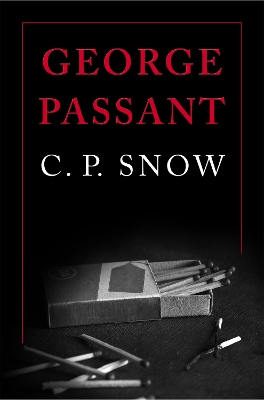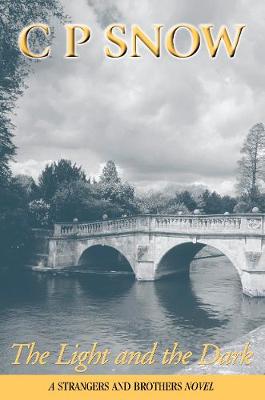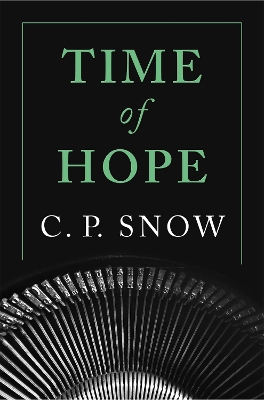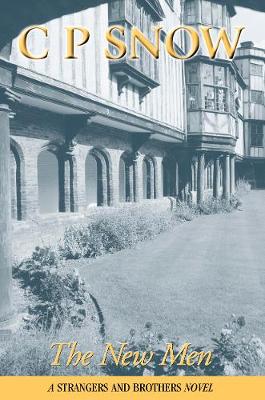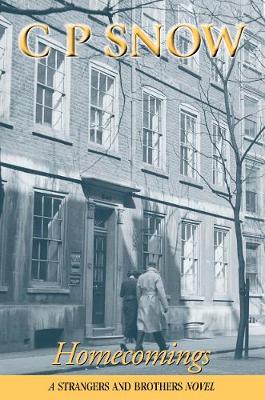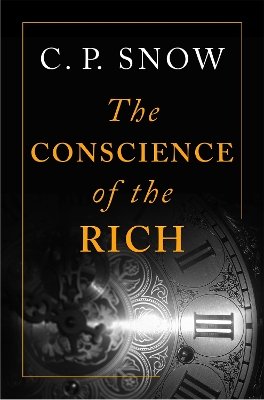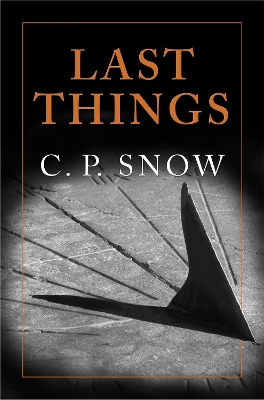Strangers and Brothers
11 primary works
Book 1
Lewis Eliot, the diffident protagonist of the Strangers and Brothers sequence, retreats to the background in this absorbing study of his mentor, George Passant, a charismatic solicitor’s clerk.
In the years of economic depression between the wars, George – an idealistic radical bursting with notions of creating the world anew – gathers about him a group of young people who, restive and ambitious, trust him to emancipate them from the constraints of their provincial lives. But when his lofty aspirations become muddied with a need for money and desire for sexual freedom, his power over the group becomes a danger to them all.
Politics, people and the rapidly changing social landscape of inter-war Britain are narrated with Snow’s trademark subtlety and precision in this fascinating analysis of a god with feet of clay.
A meticulous study of the public issues and private problems of post-war Britain, C. P. Snow’s Strangers and Brothers sequence is a towering achievement that stands alongside Anthony Powell’s A Dance to the Music of Time as one of the great romans-fleuves of the twentieth century.
Book 2
The stability and resilience of Lewis Eliot is sharply contrasted with the melancholia of his brilliant colleague, Roy Calvert, in the fourth novel of C. P. Snow's masterful Strangers and Brothers sequence.
Opening in Cambridge in 1935 and ending in London in 1943, all of Roy's brief and dazzling academic career is narrated in this powerful study of manic depression. A charming iconoclast, he shakes the staid foundations of the university with his mischievous disregard for authority, his outbursts against elders who are not betters, and his reckless pursuit of women. But his buoyant joie de vivre masks a terrible illness, and fatalism and growing despair push him into a flirtation with Nazism, and on to a terrible path to tragedy.
Perhaps the most moving of Snow's novels, The Light and the Dark is a deeply felt account of a complicated man's search for greater meaning in the turbulent, and often senseless, years preceding the Second World War.
A meticulous study of the public issues and private problems of post-war Britain, C. P. Snow's Strangers and Brothers sequence is a towering achievement that stands alongside Anthony Powell's A Dance to the Music of Time as one of the great romans-fleuves of the twentieth century.
Praise for the Strangers and Brothers sequence
"Together, the sequence presents a vivid portrait of British academic, political and public life. Snow was that rare thing, a scientist and novelist." Jeffrey Archer, Guardian
"Balzacian masterpieces of the age" Philip Hensher, Telegraph
"Through [the Strangers and Brothers sequence] as in no other work in our time we have explored the inner life of the new classless class that is the 20th century Establishment" New York Times
"A very considerable achievement ... It brings into the novel themes and locales never seen before (except perhaps in Trollope)." Anthony Burgess
Book 3
The life of Lewis Eliot – documented across eleven novels with C. P. Snow’s distinctive blend of precision and compassion – begins in Time of Hope.
The novel opens in the summer of 1914 when nine-year-old Lewis hears the news of his father’s bankruptcy, and closes in 1933, when, although hindered in his promising career as a lawyer by the neuroses of his wife, he realises that he cannot bear to leave her. In the course of this ambitious but ultimately unremarkable man’s early life rage the great questions of the age – questions of class, of gender, of ideology and of war – asked and answered with wisdom and tolerance.
A meticulous study of the public issues and private problems of post-war Britain, C. P. Snow’s Strangers and Brothers sequence is a towering achievement that stands alongside Anthony Powell’s A Dance to the Music of Time as one of the great romans-fleuves of the twentieth century.
Book 4
Winner of 1954 James Tait Black Memorial Prize for Fiction.
Widely regarded as C. P. Snow's masterpiece, this lucid and compelling story of the contest for the Mastership of a Cambridge college is the fifth novel in C. P. Snow's magnificent Strangers and Brothers sequence.
As the old Master slowly dies of cancer, his colleagues and peers jostle for power. Two candidates come to the foreground; Paul Jago - warm and sympathetic, but given to extravagant moods and hindered by an unsuitable wife - and Crawford, a shrewd, cautious and reliable man who lacks any of Jago's human gifts. For Lewis Eliot, through whose eyes the narrative unfurls, the choice is clear, but politics and egos soon cloud the debate and the College is torn in two.
Depicting power in a confined setting with clarity and humanity, The Masters remains unsurpassed in its quiet, authoritative insight into the politics of academia.
A meticulous study of the public issues and private problems of post-war Britain, C. P. Snow's Strangers and Brothers sequence is a towering achievement that stands alongside Anthony Powell's A Dance to the Music of Time as one of the great romans-fleuves of the twentieth century.
Book 5
Winner of 1954 James Tait Black Memorial Prize for Fiction.
As the Second World War draws to a close, Lewis Eliot becomes entangled in the ethics and practicalities of nuclear warfare, in the sixth novel of C. P. Snow's Strangers and Brothers sequence.
His scientist brother, Martin, and brilliant Cambridge fellow, Walter Luke, are researching atomic fission and trying to develop a war-winning bomb. Around them civil servants are jostling for position, ageing politicians are trying to stay relevant, and the military are pressuring for results. And all the time they must wrestle with reconciling the advancement of science with the creation of a weapon they hope will never be used.
A quiet portrait of ordinary, fallible human beings caught up in the most terrifying research of all time, The New Men is told with a simplicity and measure and lack of sensationalism that singles Snow out from his contemporaries.
A meticulous study of the public issues and private problems of post-war Britain, C. P. Snow's Strangers and Brothers sequence is a towering achievement that stands alongside Anthony Powell's A Dance to the Music of Time as one of the great romans-fleuves of the twentieth century.
Praise for the Strangers and Brothers sequence
"Together, the sequence presents a vivid portrait of British academic, political and public life. Snow was that rare thing, a scientist and novelist." Jeffrey Archer, Guardian
"Balzacian masterpieces of the age" Philip Hensher, Telegraph
"Through [the Strangers and Brothers sequence] as in no other work in our time we have explored the inner life of the new classless class that is the 20th century Establishment" New York Times
"A very considerable achievement ... It brings into the novel themes and locales never seen before (except perhaps in Trollope)." Anthony Burgess
Book 6
The personal life of Lewis Eliot, the central figure and narrator of C. P. Snow's Strangers and Brothers, takes centre stage in this moving account of his wartime years.
The suicide of Lewis's desperately vulnerable wife, Sheila, ends a marriage fraught with difficulty and pain and shakes his world to the foundations. As Britain enters the Second World War he is swept up into the civil service, and meets Margaret Davidson, a woman who may offer him emotional redemption - but who is already married.
With its exceptionally sensitive and insightful exploration of the human condition, Homecomings demonstrates C. P. Snow's masterly insight into character, whether in the home or along the corridors of power.
A meticulous study of the public issues and private problems of post-war Britain, C. P. Snow's Strangers and Brothers sequence is a towering achievement that stands alongside Anthony Powell's A Dance to the Music of Time as one of the great romans-fleuves of the twentieth century.
Praise for the Strangers and Brothers sequence
"Together, the sequence presents a vivid portrait of British academic, political and public life. Snow was that rare thing, a scientist and novelist." Jeffrey Archer, Guardian
"Balzacian masterpieces of the age" Philip Hensher, Telegraph
"Through [the Strangers and Brothers sequence] as in no other work in our time we have explored the inner life of the new classless class that is the 20th century Establishment" New York Times
"A very considerable achievement ... It brings into the novel themes and locales never seen before (except perhaps in Trollope)." Anthony Burgess
Book 7
In this, the quietly powerful third novel in C. P. Snow’s Strangers and Brothers sequence, Lewis Eliot narrates the world of the great Anglo-Jewish banking dynasties between the two World Wars.
Drawn into the fold of one such family by his friendship with the son and heir, Charles March, Lewis observes the impact of the changing world on their closed and privileged circle. The forces of communism and fascism, the rise of Hitler and steady progress of the nation towards war are interwoven with domestic crises; Charles defects from his promising legal career in favour of medicine, his sister Kathrine falls in love with a gentile, and his uncle becomes incriminated in shady political deal-making, and the family slowly falls apart.
Told with the mixture of humanity and exactitude that is uniquely Snow’s, The Conscience of the Rich painstakingly documents the swansong of the British upper-classes.
A meticulous study of the public issues and private problems of post-war Britain, C. P. Snow’s Strangers and Brothers sequence is a towering achievement that stands alongside Anthony Powell’s A Dance to the Music of Time as one of the great romans-fleuves of the twentieth century.
Praise for the Strangers and Brothers sequence
“Together, the sequence presents a vivid portrait of British academic, political and public life. Snow was that rare thing, a scientist and novelist.” Jeffrey Archer, Guardian
“Balzacian masterpieces of the age” Philip Hensher, Telegraph
“Through [the Strangers and Brothers sequence] as in no other work in our time we have explored the inner life of the new classless class that is the 20th century Establishment” New York Times
“A very considerable achievement … It brings into the novel themes and locales never seen before (except perhaps in Trollope).” Anthony Burgess
Book 8
The eighth novel in C. P. Snow's Strangers and Brothers sequence sees a return to the Cambridge college of The Masters, where an apparent miscarriage of justice once again ranges the fellows against one another.
The unpopular Dr Donald Howard is dismissed for academic fraud, much to the relief of the other dons, who find little to like in either his research or his far-left political views. But when doubt creeps into the evidence the fellows are sharply divided into two camps, with Lewis Eliot - through whose eyes we watch the events unfold - ranged firmly on the side of justice in this academic Affaire Dreyfus.
Masterfully crafted and full of suspense, The Affair is perhaps the most gripping novel in the sequence and became a successful West End play.
A meticulous study of the public issues and private problems of post-war Britain, C. P. Snow's Strangers and Brothers sequence is a towering achievement that stands alongside Anthony Powell's A Dance to the Music of Time as one of the great romans-fleuves of the twentieth century.
Praise for the Strangers and Brothers sequence
"Together, the sequence presents a vivid portrait of British academic, political and public life. Snow was that rare thing, a scientist and novelist." Jeffrey Archer, Guardian
"Balzacian masterpieces of the age" Philip Hensher, Telegraph
"Through [the Strangers and Brothers sequence] as in no other work in our time we have explored the inner life of the new classless class that is the 20th century Establishment" New York Times
"A very considerable achievement ... It brings into the novel themes and locales never seen before (except perhaps in Trollope)." Anthony Burgess
"The most comprehensive, the most informative and, all in all, the most impressive portrait of modern England that any novelist has yet given us." Michael Millgate, Commentary
Book 9
Lewis Eliot walks the echoing corridors of Whitehall observing political intrigues and shifting alliances in this exceptional portrait of the heart of the British government during the Suez Crisis.
At its centre is Roger Quaife, an ambitious MP determined to denuclearize Britain. His weapons: persuasiveness and a consummate skill in top-level diplomacy. In the committee rooms of Whitehall he plays with the highest stakes imaginable as he challenges the Government's armaments policy. What ensues is a fascinating study of power - personal and political - handled with Snow's inimitable authenticity and intimacy.
Deservedly famed as one of the most accomplished political novels of all time, Corridors of Power goes behind the scenes of the Cold War with precision and humanity.
A meticulous study of the public issues and private problems of post-war Britain, C. P. Snow's Strangers and Brothers sequence is a towering achievement that stands alongside Anthony Powell's A Dance to the Music of Time as one of the great romans-fleuves of the twentieth century.
Praise for the Strangers and Brothers sequence
"Together, the sequence presents a vivid portrait of British academic, political and public life. Snow was that rare thing, a scientist and novelist." Jeffrey Archer, Guardian
"Balzacian masterpieces of the age" Philip Hensher, Telegraph
"Through [the Strangers and Brothers sequence] as in no other work in our time we have explored the inner life of the new classless class that is the 20th century Establishment" New York Times
"A very considerable achievement ... It brings into the novel themes and locales never seen before (except perhaps in Trollope)." Anthony Burgess
"The most comprehensive, the most informative and, all in all, the most impressive portrait of modern England that any novelist has yet given us." Michael Millgate, Commentary
Book 10
Sir Lewis Eliot returns to his hometown in the tenth, and penultimate, novel in the Strangers and Brothers sequence.
Although now mature in the world of affairs and in possession of a knighthood, the older Lewis has much to contend with - his eyesight is failing and a risky operation is on the horizon, his father is dying, and his old mentor, George Passant, has asked him to observe the trial of his niece - a young woman accused of the torture and murder of a child . . .
Written in the wake of the notorious Moors murders, The Sleep of Reason depicts an ageing generation struggling to understand the new, more permissive society of the 1960s, with great insight and sensitivity.
A meticulous study of the public issues and private problems of post-war Britain, C. P. Snow's Strangers and Brothers sequence is a towering achievement that stands alongside Anthony Powell's A Dance to the Music of Time as one of the great romans-fleuves of the twentieth century.
Praise for the Strangers and Brothers sequence
"Together, the sequence presents a vivid portrait of British academic, political and public life. Snow was that rare thing, a scientist and novelist." Jeffrey Archer, Guardian
"Balzacian masterpieces of the age" Philip Hensher, Telegraph
"Through [the Strangers and Brothers sequence] as in no other work in our time we have explored the inner life of the new classless class that is the 20th century Establishment" New York Times
"A very considerable achievement ... It brings into the novel themes and locales never seen before (except perhaps in Trollope)." Anthony Burgess
"The most comprehensive, the most informative and, all in all, the most impressive portrait of modern England that any novelist has yet given us." Michael Millgate, Commentary
Book 11
The world of Sir Lewis Eliot draws to a close in Last Things, the eleventh and final novel in C. P. Snow’s decade-spanning Strangers and Brothers sequence.
After his heart stops briefly on the operating table, Sir Lewis is compelled to reflect on his life, to pass judgement on his hopes and achievements, and to prepare his brilliant and beloved son, Charles, for the future.
Thoughtful and elegiac, but ultimately suffused with optimism, Last Things is a fitting conclusion to a cycle of novels distinguished by their humane reflection and willingness to portray the lives of men – great and small – with unfailing insight and compassion.
A meticulous study of the public issues and private problems of post-war Britain, C. P. Snow’s Strangers and Brothers sequence is a towering achievement that stands alongside Anthony Powell’s A Dance to the Music of Time as one of the great romans-fleuves of the twentieth century.
Praise for the Strangers and Brothers sequence
“Together, the sequence presents a vivid portrait of British academic, political and public life. Snow was that rare thing, a scientist and novelist.” Jeffrey Archer, Guardian
“Balzacian masterpieces of the age” Philip Hensher, Telegraph
“Through [the Strangers and Brothers sequence] as in no other work in our time we have explored the inner life of the new classless class that is the 20th century Establishment” New York Times
“A very considerable achievement … It brings into the novel themes and locales never seen before (except perhaps in Trollope).” Anthony Burgess
“The most comprehensive, the most informative and, all in all, the most impressive portrait of modern England that any novelist has yet given us.” Michael Millgate, Commentary
